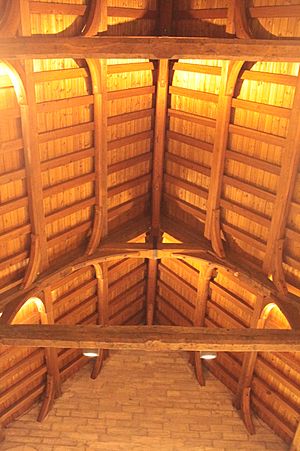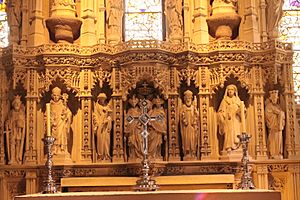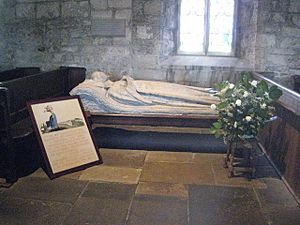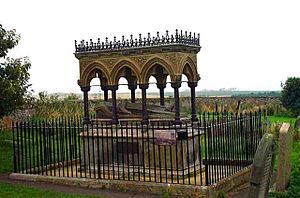St Aidan's Church, Bamburgh facts for kids
Quick facts for kids St Aidan's Church, Bamburgh |
|
|---|---|
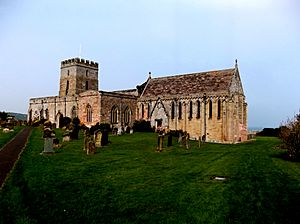
St Aidan's Church, Bamburgh
|
|
| 55°36′29.17″N 1°43′5.61″W / 55.6081028°N 1.7182250°W | |
| Location | Radcliffe Road, Bamburgh, Northumberland NE69 7AB |
| Country | England |
| Denomination | Church of England |
| History | |
| Dedication | St Aidan |
| Architecture | |
| Heritage designation | Grade I listed |
| Administration | |
| Parish | Bamburgh |
| Deanery | Bamburgh & Glendale |
| Archdeaconry | Lindisfarne |
| Diocese | Diocese of Newcastle |
St Aidan's Church is a very old and important church located in Bamburgh, Northumberland, England. It is part of the Church of England and is considered a Grade I listed building, which means it's a really special historical place.
Contents
History of St Aidan's Church
Early Beginnings and St Aidan
The story of St Aidan's Church goes way back to the year 635 AD. A famous historian named Bede wrote that St Aidan built a wooden church right where the stone church stands today. This first church was just outside the walls of Bamburgh Castle. St Aidan was a very important person in early Christianity in England. He passed away at this church in 652 AD. There's even a wooden beam inside the church that people say is the very one he rested on when he died!
Building the Stone Church
The church you see today was mostly built much later, starting in the late 1100s. However, some parts of the church, especially in the north aisle, still have stones from even older times, before the Norman Conquest.
Around 1230, a long section called the chancel was added. It's one of the longest chancels in any church in England, stretching about 60 feet! Inside, you can see a beautiful stone carving from 1895 called a reredos. It shows important saints from the 600s and 700s. The older, eastern part of the church has a special timber roof that looks like Saxon style.
Changes Over Time
In the mid-1500s, big changes happened in England during the Dissolution of the Monasteries. Monks who lived and worked at the church had to leave. After this, St Aidan's became the main church for the village.
For a while, the church wasn't looked after very well and by 1600, it was in poor condition. But don't worry, repairs were eventually made! Over the next few centuries, the church was fixed up many times, with major restoration work done in the 1800s, and the last big one in 1895.
Ancient Bones in the Crypt
Deep beneath the church, in a special underground room called a crypt, lie the remains of 110 people. These people lived and died in the 600s and 700s. Their bones were found between 1998 and 2007 during a project at the castle's old graveyard. In 2016, they were carefully moved to the church crypt.
Since November 2019, visitors can actually see the crypt through a small gate. There's also a display and digital tools called "Accessing Aidan" that help visitors learn about these ancient people.
Important Memorials
St Aidan's Church has many memorials that tell stories of people from the past.
Grace Darling Memorials
One of the most famous memorials is dedicated to Grace Darling, a local hero. She was known for her bravery in rescuing shipwrecked sailors. Inside the church, there's a stone statue of Grace Darling from 1844. This statue was once part of a larger memorial outside in the churchyard. It was moved inside to protect it from the weather.
The main Monument to Grace Darling is still in the churchyard. It was designed so that sailors passing by on ships could see it.
Other Notable Memorials
- There's a tomb from the 1300s with a statue of a Knight.
- You can find wall monuments for important families like the Forster family and a memorial for the Sharpe family from 1839.
- A brass plaque remembers Arthur Lionel Smith, a historian.
- There's also a memorial for Major General George Younghusband.
- In the churchyard, there is one grave for an airman who died during World War II. This is looked after by the Commonwealth War Graves Commission.
The Church Organ
The church has a pipe organ built by a company called Harrison and Harrison in 1883. It has two keyboards, which means it can make a wide range of sounds.
 | Audre Lorde |
 | John Berry Meachum |
 | Ferdinand Lee Barnett |


